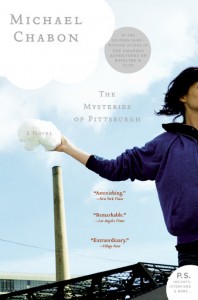Follow Scott
Recent Tweets
- Waiting for Twitter... Once Twitter is ready they will display my Tweets again.
Latest Photos
Search
Tags
anniversary Balticon birthdays Bryan Voltaggio Capclave comics Cons context-free comic book panel conventions DC Comics dreams Eating the Fantastic food garden horror Irene Vartanoff Len Wein Man v. Food Marie Severin Marvel Comics My Father my writing Nebula Awards Next restaurant obituaries old magazines Paris Review Readercon rejection slips San Diego Comic-Con Scarecrow science fiction Science Fiction Age Sharon Moody Stan Lee Stoker Awards StokerCon Superman ukulele Video Why Not Say What Happened Worldcon World Fantasy Convention World Horror Convention zombies
©2025 Scott Edelman
Marveling at The Mysteries of Pittsburgh
Posted by: Scott
Tags:
Michael Chabon
Posted date:
January 19, 2008 |
No comment
I’m about halfway through Michael Chabon’s The Mysteries of Pittsburgh. I know that I’m late to the party (it was first published in 1988, after all), and you’ve all probably read this book years ago. But I guess I’ve always been avoiding it, even though I loved The Amazing Adventures of Kavalier & Klay, feeling as if that more recent book had been written with only an audience of me in mind. I didn’t want to go backward through Chabon’s oeuvre, because I was sure that I would only be disappointed. After so perfect a book as Kavalier & Klay, wouldn’t even a near-perfect book seem flawed and primitive by comparison?
But then a review copy of the new edition of The Mysteries of Pittsburgh showed up in the mail last week. I have no idea why; there’s no reason Science Fiction Weekly would ever run a review of a 20-year-old non-genre book. And I thought—it’s a sign. Time to cast off my silly fears and finally read the thing. I figured, well, it would be what it would be, and no matter what I ended up thinking of it, moving back in time would not diminish my love for Chabon’s more mature work.
So I’m here to report, from my vantage point of having reached page 140 of a 297-page novel, that it hasn’t. If anything, the book so far leaves me even more dazzled by Chabon’s talent. And a little bit amazed as well. The book was written as Chabon’s master’s thesis at the University of California at Irvine, and published when he was only 25! To be that accomplished a stylist and that insightful an observer of human behavior so early in one’s career is remarkable. I found phrases at which to marvel on every page.
Take this passage describing our protagonist watching the approach of his new friends:
Arthur and Phlox, side by side, approached from the direction of the library. Phlox wore pearls, a strapless white dress patterned with blue flowers, and a pair of high-heeled white sandals; Arthur, light-gray trousers and a powder-blue blazer, with a tie, and oxfords without socks, like Prince Philip. They were still far from me, and I watched as those they passed turned admiring heads; they drew near like an advertisement for summer and beauty and healthy American sex. The sun was in their faces, but they neither squinted nor averted their eyes; the light fell across Phlox’s necklace and Arthur’s hair and the hint of silver wristwatch at his cuff. I felt another of those sudden onslaughts of love, the desire to run to them and embrace them both, to be seen in their company, to live my life among men and women who dressed up like this and then went down the sidewalk like cinema kings.
Or this description of movement as a meal is being prepared:
“Was it stark? Starkly sensual?” As she chopped, he orbited her, slow as Jupiter, regarding her from every angle, but on this last word his orbit decayed and he fell against her, softly.
Or this explanation of a couple’s interactions:
Jane and Cleveland had been an item for nearly six years, and although their manner with each other was utterly familiar, they nonetheless displayed all the intoxicated rancor of a brand-new couple. It was as though they still had not decided if they liked each other. When she looked at him lovingly, her eyes were filled with the strong regret and disapproval of a mother with a jailbird son. And though when speaking to her he came closer than with anyone else to ridding his voice of its smirk, nevertheless the smirk remained. I think that fundamentally he was jealous of her: not of any phantom lovers—for she never had any—but jealous of her, of her half-English crazy optimism and her manias for salad-making and endless walks. And I think that Jane was afraid for Cleveland, afraid of the inevitable day when he really would ruin everything.
I could go on like this, because the tale is consistently told with language that is both poetic and precise. But that, of course, only tells you something about this novel on a micro level. What about on a macro level? What about the story? As I said above, I’m only about halfway through the book, and for all I know, by the time I reach page 297, I might feel that Chabon didn’t pull off what he intended to pull off, but from my current vantage point, I find the characters vibrant and alive, and care about them, their problems, and their futures.
So—language poetic, characters compelling, story intriguing. I was a fool to have waited so long!

